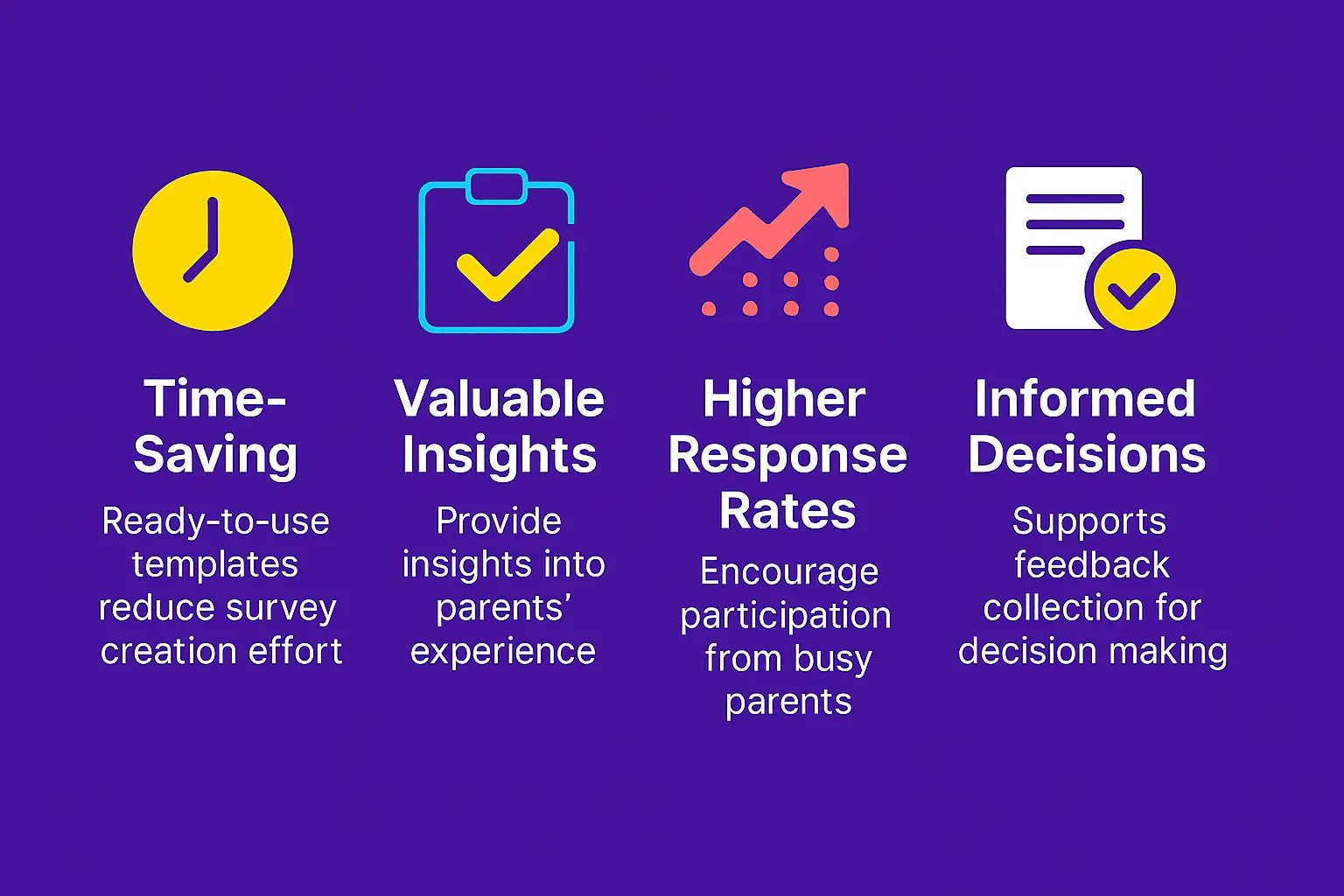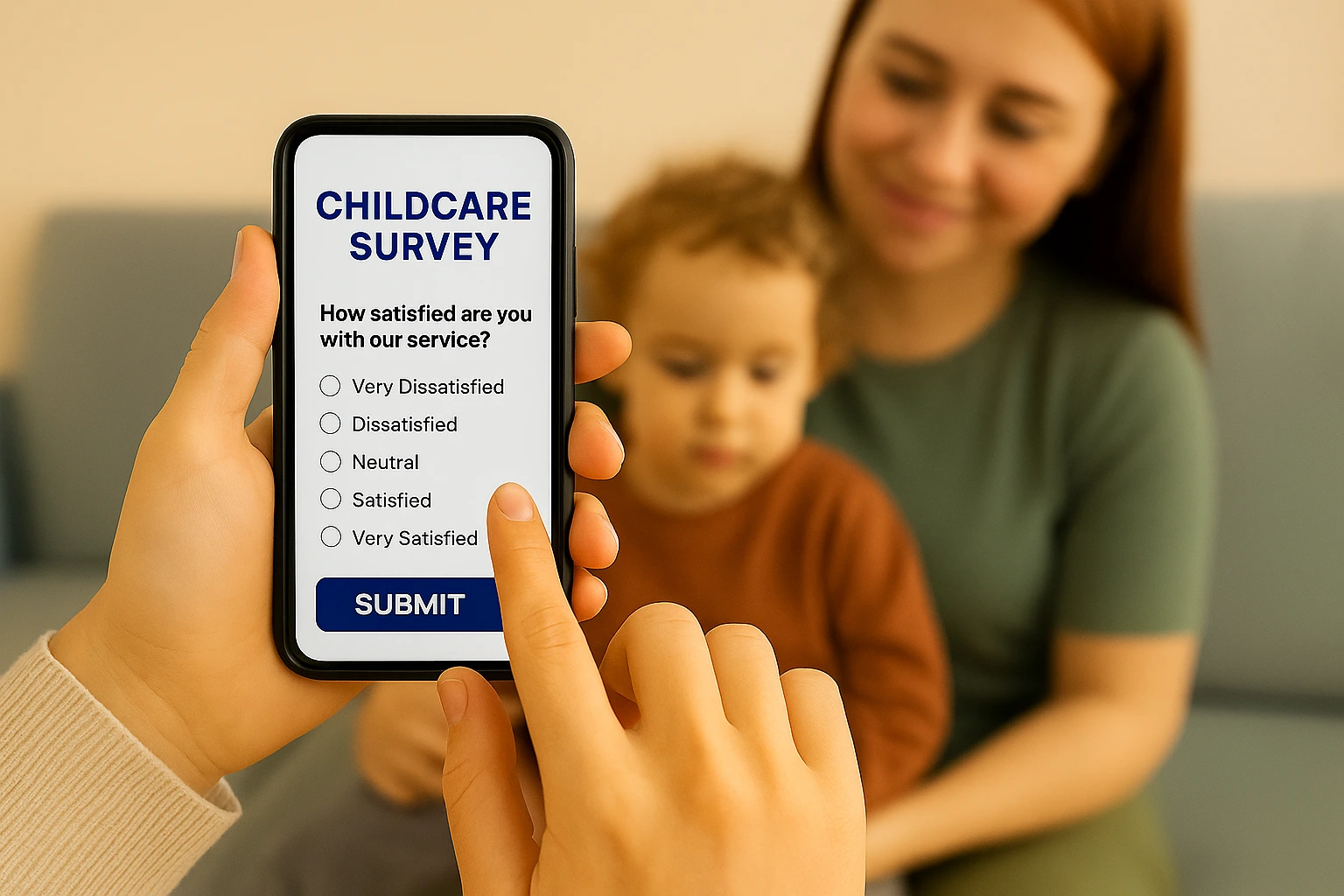Gathering feedback from parents is a cornerstone of enhancing childcare services and building strong family connections. Childcare survey templates provide a structured, efficient way to collect feedback, focusing on areas like child's development, parent satisfaction, and overall quality of the childcare program.
Whether you’re managing a daycare, preschool, or early childhood education center, well-designed parent survey questions can transform your approach by addressing specific needs and driving continuous improvement.
This comprehensive guide explores everything you need to build an impactful daycare parent satisfaction survey. By leveraging these insights and examples, childcare providers can foster better relationships with families and enhance the childcare experience.
Why Childcare Survey Templates Are Essential
Childcare survey templates are pre-designed tools that streamline the process of gathering feedback from parents. They help understand parent perspectives on child's education, safety, teaching methods, and classroom environment, enabling childcare providers to identify areas for enhancement and support parents effectively.

Customizing these templates to reflect specific goals - such as evaluating field trips, parental involvement, or student's success - ensures they meet the unique needs of families.
This adaptability enhances overall satisfaction and strengthens the bond between childcare centers and parents, making it a vital tool for long-term improvement in childcare settings.
Key Components of Effective Childcare Survey Templates
Creating a childcare survey that yields meaningful results requires clarity, variety, and relevance. Start with clear, concise parent survey questions like “How satisfied are you with child's teachers?” using a rating scale to gather feedback and provide valuable insights into teaching quality.
Incorporate multiple choice options, such as “How often do you attend parent teacher conferences? (Monthly, Rarely, Never),” and open ended questions like “What suggestions improve child's learning?” to encourage participation and gather detailed feedback.
60+ Sample Parent Survey Questions: Examples and Overview
This section includes over 60 parent survey questions integrated directly into the article, providing a comprehensive set to collect feedback on various aspects of the childcare experience. These questions span multiple categories to ensure a thorough understanding of parent perspectives, child's development, and program effectiveness.
Overall Satisfaction (10 Questions)
- How satisfied are you with our childcare services? (1 = Very Dissatisfied, 5 = Very Satisfied)
- How likely are you to recommend our center to other parents? (1 = Not Likely, 5 = Extremely Likely)
- How well does our program meet your expectations? (1 = Not at All, 5 = Exceeds Expectations)
- Does the value provided match the fees charged? (1 = Strongly Disagree, 5 = Strongly Agree)
- What aspects of our services do you appreciate most? (Open-ended)
- What improvements would enhance your overall experience? (Open-ended)
- How would you rate the overall quality of our childcare center? (1-5)
- Are you satisfied with the cleanliness of the facility? (1 = Very Dissatisfied, 5 = Very Satisfied)
- How welcoming is the atmosphere for parents and children? (1-5)
- Would you re-enroll your child based on current satisfaction? (Yes, No, Maybe)
Child's Progress (10 Questions)
- Are you informed about your child’s progress? (Yes, No)
- How clear are updates from child's teachers? (1 = Very Unclear, 5 = Very Clear)
- Do you see improvements in child’s success? (1 = Strongly Disagree, 5 = Strongly Agree)
- How often are parent teacher conferences held? (Monthly, Quarterly, Rarely)
- What feedback would help track child’s learning? (Open-ended)
- Are progress reports provided in a timely manner? (Yes, No, Sometimes)
- How well do teachers communicate your child’s achievements? (1-5)
- Do you receive regular updates on child’s development milestones? (Yes, No)
- Are you satisfied with the frequency of progress discussions? (1-5)
- What additional information would improve tracking of child’s progress? (Open-ended)
Parental Engagement (12 Questions)
- How often do you participate in school events? (Never, Rarely, Sometimes, Often)
- Do you feel involved in parent engagement survey activities? (1 = Not Involved, 5 = Very Involved)
- What motivates your parental involvement? (Open-ended)
- Are you invited to open forum discussions? (Yes, No)
- How can we encourage participation more? (Open-ended)
- Do you attend parent teacher conferences regularly? (Yes, No, Occasionally)
- How satisfied are you with opportunities for parental involvement? (1-5)
- Are you informed about upcoming school events in advance? (Yes, No)
- How often do you volunteer for childcare center activities? (Never, Rarely, Sometimes, Often)
- What types of events would increase your engagement? (Open-ended)
- Do you feel your input is valued during engagement activities? (1-5)
- How can we improve communication for parent engagement? (Open-ended)
Child's Education (12 Questions)
- Are educational/curriculum needs met for child’s development? (1 = Not Met, 5 = Fully Met)
- How engaging are teaching methods? (1 = Not Engaging, 5 = Very Engaging)
- Are extracurricular activities beneficial? (1 = Not Beneficial, 5 = Very Beneficial)
- How satisfied are you with field trips? (1 = Very Dissatisfied, 5 = Very Satisfied)
- What suggestions improve child’s education? (Open-ended)
- Are the learning materials up to date and relevant? (1-5)
- How well do activities support child’s learning goals? (1-5)
- Are there enough opportunities for creative expression? (1-5)
- How effective are the teaching methods for child’s success? (1-5)
- Do you see progress in your child’s educational skills? (Yes, No, Sometimes)
- Are educational programs and curriculum tailored to different age groups? (1-5)
- What additional educational resources would benefit your child? (Open-ended)
Support for Parents (10 Questions)
- Does the center support parents effectively? (1 = Not Supportive, 5 = Very Supportive)
- How accessible are school administrators? (1 = Not Accessible, 5 = Very Accessible)
- Are resources helpful for families? (1 = Not Helpful, 5 = Very Helpful)
- How easy is feedback collection? (1 = Very Difficult, 5 = Very Easy)
- What support would benefit your family? (Open-ended)
- Are there adequate resources for parents during emergencies? (Yes, No)
- How satisfied are you with communication from school administrators? (1-5)
- Do you feel supported in understanding your child’s needs? (1-5)
- Are there workshops or training for parents? (Yes, No, Occasionally)
- What additional support services would enhance your experience? (Open-ended)
Safety and Facilities (6 Questions)
- Do you feel confident in the safety measures at the facility? (1 = Strongly Disagree, 5 = Strongly Agree)
- How would you rate the cleanliness of the childcare center? (1 = Very Poor, 5 = Excellent)
- Are play areas adequately maintained? (1 = Strongly Disagree, 5 = Strongly Agree)
- How secure is the entry and exit system? (1 = Not Secure, 5 = Very Secure)
- Are emergency exits clearly marked and accessible? (Yes, No)
- What changes would improve the safety of the facility? (Open-ended)
These 60+ questions provide a robust framework for collecting parent feedback, identifying areas for improvement, and enhancing the childcare experience. They cover a wide range of topics to ensure comprehensive feedback collection and support informed decisions by childcare providers.
Tips to Create a Childcare Survey for Parents
- Define clear objectives, such as understanding parent perspectives on child's success, to guide your survey questions.
- Use simple language and test the survey with a small group of parents to refine it and ensure clarity.
- Incorporate engaging visuals like progress bars or infographics to encourage participation and make the survey visually appealing.
- Offer anonymity for honest parent feedback forms to build trust and increase response rates.
- Share survey results and action plans with parents to demonstrate how their input shapes informed decisions.
- Time distribution for term-end or after school events, avoiding holidays, to boost participation and gather fresh feedback.
- Use mobile-friendly platforms or other form builders to make the survey easy to access.
- Ensure the survey is concise—aim for 10-15 questions—and pilot test to identify areas for improvement.
- Provide clear instructions and support options to help parents navigate the process and offer suggestions.
Drawing inspiration from best practices can enhance survey effectiveness. For instance, requiring families to sign a contract outlining survey expectations and communicating proactively about the process can improve participation.
Encouraging open communication and offering flexibility, like adjustable question formats, can also build stronger community trust.
Common Mistakes to Avoid in Childcare Surveys
Conclusion
Childcare survey templates are powerful tools for daycare and preschool providers to enhance their childcare program and support families. By integrating over 60 parent survey questions, you can collect feedback to drive meaningful improvements in child's education, parent satisfaction, and overall quality of the childcare center.
Follow the tips to create effective surveys, avoid common mistakes outlined in the tables, and plan for a downloadable PDF to provide actionable insights. Start implementing these strategies today to elevate your childcare center’s quality, strengthen parental involvement, and transform parent feedback into growth opportunities for your community!





![Looking for free survey templates?{{ include_custom_fonts({"Lexend":["Black","Bold","Extra Bold","Extra Light","Light","Medium","Regular","Semi Bold","Thin"]}) }}](https://no-cache.hubspot.com/cta/default/6338249/interactive-194230606521.png)
![Transform parent feedback into growth opportunities{{ include_custom_fonts({"Lexend":["Black","Bold","Extra Bold","Extra Light","Light","Medium","Regular","Semi Bold","Thin"]}) }}](https://no-cache.hubspot.com/cta/default/6338249/interactive-194230943119.png)


.webp)
.webp)